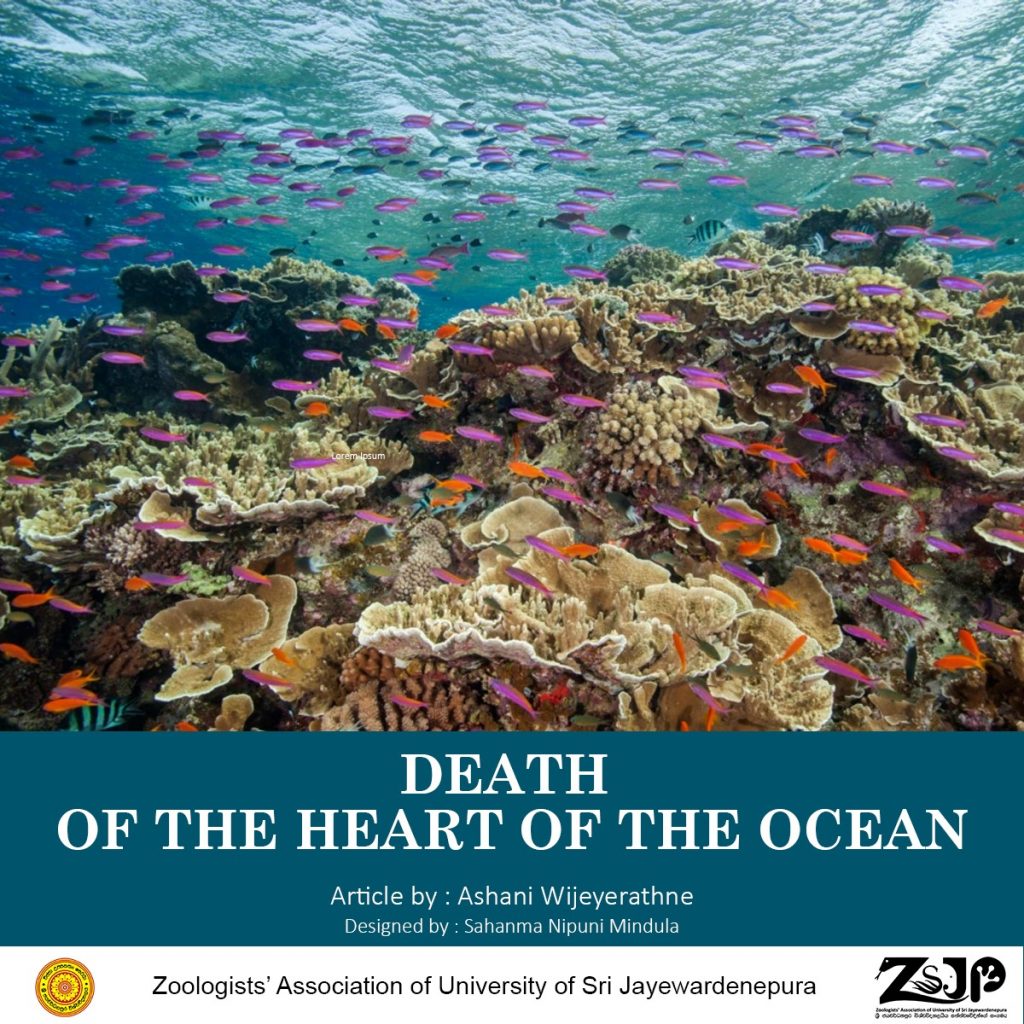Death of the heart of the Ocean
Article by- Ashani Wijeyerathne

Coral reefs are the most vulnerable marine ecosystem on earth. They’re incontrovertibly critical parts of the ocean. Most people don’t realize the importance of the coral reef system to the tune of its multi-billion-dollar value. Although these ecosystems only occupy 0.01% of the seafloor, they bristle with life and around one-quarter of all ocean species depend on reefs for food and shelter. Reefs are rich in biodiversity and frequently called the “rainforests of the ocean”.
Corals are the foundation of the ocean’s food chain, from tiny plankton to the largest creatures in the ocean. They face local and global hazards including overfishing, deposition, marine pollution, and increasing ocean warming and acidification. Climate change is one of the natural factors that impacted coral reefs and was caused by the increasing concentration of carbon dioxide in the atmosphere. Rising ocean temperatures are disturbing the symbiosis between coral organisms and algae. Thermal stress results in bleached corals. It has become the main cause of coral mortality in the last 20 years. The rising ocean temperature can also affect the growth and reproduction of corals.
The death of coral also represents a huge loss to our environment. Coral reefs also have a significant impact on coastal communities, with one billion people are being serviced from their existence. The loss of coral reefs would amount to an economic disaster, depriving fishermen of their main source of income and undermining the tourism industry. They also secure shorelines from flooding during extreme storms. As the coral reefs die, shorelines become more susceptible to damage and flooding from storms, hurricanes, and cyclones. Scientists develop important medicines from coral reef organisms as treatments for Cancer, Arthritis, and Viruses. Due to the destruction, it affects human health.
Perhaps the most concerning aspect of coral loss is what it suggests about the future. The fragile nature of coral reefs leaves them hypersensitive to climate change. There’s much that we can do locally to protect coral reefs. Well-defended reefs today, generally have much healthier coral populations and are more flexible. Fish play important roles on coral reefs, particularly the fish that eat seaweeds and keep them from smothering corals, and also, they eat the predators of corals, such as the Crown of Thorns Starfish. Marine Protected Areas (MPAs) are an important tool for keeping reefs healthy. Large MPAs cover the Great Barrier Reef and the North-western Hawaiian Islets. Smaller ones, managed by local communities, have been veritably successful in developing countries. Pure water is also important to the growth of reefs. Erosion on land causes rivers to dump mud on reefs and seawater with too many nutrients speeds up the growth of seaweeds and increases the food for predators of corals.
To say that someone is growing a century-old coral back to life sounds like it’s science fiction. But the word ‘Microfragmentation’ implies that the said statement is correct. Microfragmentation is a technique that allows corals to grow more than 25 times faster than normal. Initially, corals are broken into small pieces, using a specialized saw. It stimulates the coral tissue to grow and allows them to grow, into clones at 25 to 50 times the normal growth rate. The fragments are then placed in shallow water tanks at 22–26 degree Celsius. Clone fragments recognize each other so instead of fighting each other for resources would fuse together to form larger colonies. After 4- 12 months the fully grown corals are now ready to be planted back into the ocean or fragmented to restart the process. Furthermore, the recombined colonies become sexually mature, which would usually take up to 75 years. This technology has the potential, to make a major contribution to coral restoration.
Corals are the Heart of the Ocean, so we must make it a point to safeguard the coral reefs. With that, future generations will be able to enjoy the natural beauty of our oceans.
References
By Ashani Wijeyerathne.



